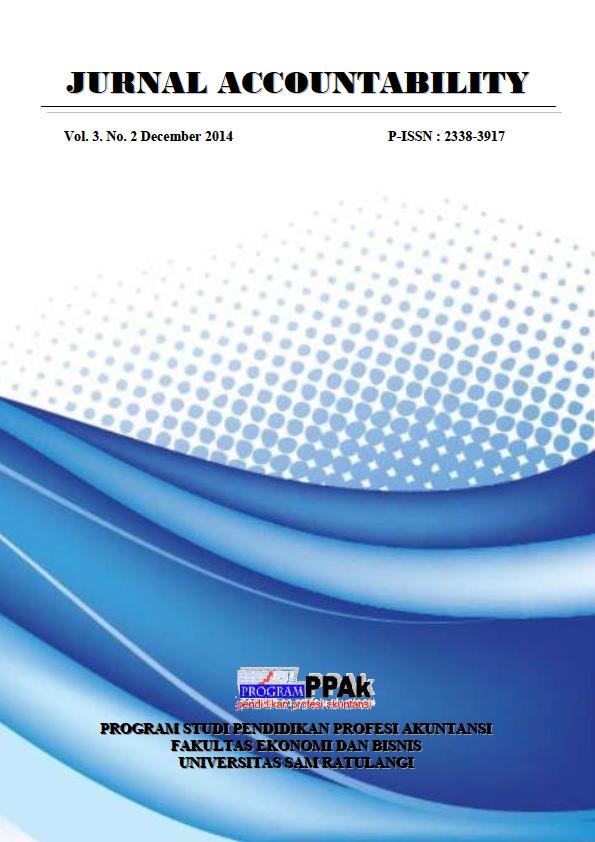ANALISIS IMPLEMENTASI SISTEM INFORMASI MANAJEMEN DAERAH (SIMDA) TERHADAP KUALITAS LAPORAN KEUANGAN SKPD (STUDI KASUS PADA DINAS PPKAD KABUPATEN MINAHASA TENGGARA)
Abstract
The purpose of this study was to obtain how to implementation of the Regional Management Information System (SIMDA) on the quality of financial reporting in the Agency of Revenue, Finance and Asset Management (DPPKAD) of Southeast Minahasa Regency.
This research method is qualitative research  with interviews and document study taken with cross-sectional approach. Interviews performed to Southeast Minahasa District Secretary about SIMDA implementation and the survey of preparation of financial statements in DPPKAD to five respondents and in SKPD to 30 treasurers.
The results reveal that the use of the SIMDA process in accordance with the mandate Minister Regulation No. 13 of 2006 on Regional Financial Management Guidelines. The SKPD participation rate is is still low, but participation by type of user has been pretty good . The data show that opinion of BPK is directly proportional to the increase in the use of SIMDA in the each of SKPD. Factors found to influence besides SIMDA to the quality of the financial statements is the human factor, the inspectorate, head of Regional leadership, feedback on BPK recommendations, and consistency in the application of SIMDA. Evaluations on human factors concluded that the level of human resources were classified based on aspects SIMDA educational background and the number of Bimtek. Inspectorate human resources is very good in quality but less in number in serving on SKPD. Local leaders considered quite good, the feedback of the BPK recommendation is quite good, and consistency in the application of SIMDA also been good.Downloads
Published
2014-12-31
Issue
Section
Articles
License
The articles published in Jurnal Accountability are licensed under Creative Commons Attribution-NonCommercial 4.0 International with authors as copyright holders.
Â

This work is licensed under a Creative Commons Attribution-NonCommercial 4.0 International License.
Â
Under this license then authors free to:
- Share — copy and redistribute the material in any medium or format.
- Adapt — remix, transform, and build upon the material.
- The licensor cannot revoke these freedoms as long as you follow the license terms.
Under the following terms:
- Attribution — You must give appropriate credit, provide a link to the license, and indicate if changes were made. You may do so in any reasonable manner, but not in any way that suggests the licensor endorses you or your use.
- NonCommercial — You may not use the material for commercial purposes.
- No additional restrictions — You may not apply legal terms or technological measures that legally restrict others from doing anything the license permits.
Notices:
- You do not have to comply with the license for elements of the material in the public domain or where your use is permitted by an applicable exception or limitation.
- No warranties are given. The license may not give you all of the permissions necessary for your intended use. For example, other rights such as publicity, privacy, or moral rights may limit how you use the material.


